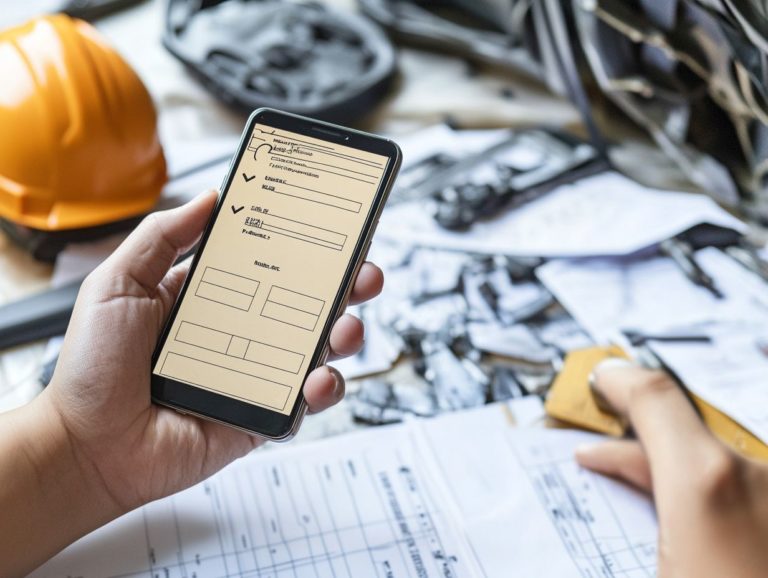Best Practices for Submitting Auto Claims
Auto insurance claims are crucial for drivers in Burlington, New Jersey. They help manage the financial impact of accidents, which can lead to serious consequences.
Whether you are dealing with a claim for vehicle damage after an accident or seeking personal injury protection, grasping the intricacies of the claims process is vital for maximizing your settlement. Many drivers often overlook crucial details, such as police reports and the importance of documenting the accident scene. These can profoundly impact your claims experience.
By utilizing resources like accident checklists and consulting with insurance professionals, you can streamline the process. This ensures you have comprehensive coverage for both car damage and bodily injury.
Contents
- Steps to Take After an Accident
- Key Takeaways:
- Filing an Auto Claim
- Working with Your Insurance Company
- Tips for a Successful Auto Claim
- Frequently Asked Questions
- What are the best practices for submitting auto claims?
- Why is it important to report auto claims as soon as possible?
- What information is needed when submitting an auto claim?
- What should I do if I am not sure about the claims process?
- Is there a deadline for submitting auto claims?
- Can I submit auto claims online?
What is an Auto Claim?
An auto claim is your formal request to an insurance company for compensation after a vehicle-related incident, such as a car accident resulting in property damage or personal injury.
This request is vital for seeking financial support following unexpected events like collisions, theft, or vandalism. Various incidents can trigger an auto claim, including:
- An at-fault accident
- Damage from natural disasters
- Hit-and-run situations
Liability insurance plays a crucial role in this process, covering the damages and injuries inflicted on others when you re deemed at fault. Remember that filing an auto claim may lead to consequences like increased future insurance premiums and potential challenges in securing coverage. It s essential to carefully weigh your options before submitting a claim.
Types of Auto Insurance Coverage
Several types of auto insurance coverage are tailored to safeguard you and your vehicle, addressing different facets of potential loss during accidents or other incidents.
Understanding these options is vital for any motorist aiming to maintain financial security on the road. For example, collision insurance covers your vehicle s repair costs after an accident, regardless of fault. On the other hand, liability insurance protects you from the financial repercussions of damages inflicted on another party.
Personal Injury Protection (PIP) adds another layer of security by covering medical expenses for you and your passengers, irrespective of fault. MedPay can assist with specific medical costs, serving as a valuable supplementary layer of protection.
Collectively, these coverage options create a robust safety net, ensuring you are prepared for a range of scenarios that may arise on your journeys.
Steps to Take After an Accident
After an accident, act quickly! Protect yourself and your vehicle by following these essential steps:
- First, assess for any injuries and call emergency personnel if necessary.
- Next, secure the accident scene. Gather evidence by taking photos and collecting information from witnesses.
- Obtaining a police report is essential, as it documents the details of the incident. This will be invaluable when you file your insurance claim.
- Completing an accident checklist can further ensure you don t overlook any important steps in the process.
Key Takeaways:
- Understand your auto insurance coverage and what is included in your policy to ensure you are properly protected in case of an accident.
- After an accident, take immediate actions to protect yourself and your vehicle, such as gathering necessary information and contacting your insurance company.
- To ensure a successful auto claim, keep thorough records and documentation, and familiarize yourself with the claims process and your policy coverage.
By following these guidelines, you can navigate the auto insurance claim process more effectively and ensure you are prepared for any challenges ahead.
Immediate Actions to Protect Yourself and Your Vehicle
If there is a car accident, your top priority should be safety. Taking immediate actions to protect yourself and your vehicle is crucial for minimizing further risks.
Once you ve confirmed that you and your passengers are safe, if it s safe to do so, move your vehicle to a less dangerous area. This simple step alleviates hazards for oncoming traffic.
After securing the area, check for injuries among everyone involved. If there are injuries, don t hesitate dial emergency personnel immediately.
Documenting the scene is vital. Take photos and gather witness information to aid any future claims or insurance discussions.
Following established safety protocols creates a safer environment and plays a key role in the claims process after an accident. It ensures that all necessary information is readily available for smooth insurance coverage.
Documenting the Accident
Documenting the accident accurately is essential for ensuring a seamless claims process and maximizing your potential insurance reimbursement. This record-keeping includes snapping photographs of the scene and vehicle damage, as well as noting any factors like weather conditions or road obstructions.
Obtaining statements from witnesses is equally important. Their accounts provide context and significantly bolster your claim. Acquiring a police report is also crucial; this official account often establishes responsibility for the accident, strengthening your case when negotiating with insurance companies.
Filing an Auto Claim
Filing an auto claim requires a thoughtful approach to inform your insurance company about the incident. Start by reaching out to your insurer to report the accident and outline any damages or injuries incurred. It’s also wise to be aware of common mistakes in auto claims and how to avoid them.
This initial step is crucial for initiating the claims process effectively.
Contacting Your Insurance Company
Contacting your insurance company promptly after an accident is vital for kickstarting the claims process and understanding the importance of timely auto claim filing to ensure your claim is submitted on time.
This proactive approach expedites claim processing and alleviates the stress of the situation. When you reach out, have relevant details ready such as the accident’s date, location, involved parties, and any police reports you may have, along with the essential documents needed for auto claims.
Navigating the claims department effectively can significantly impact your case’s outcome. Being organized and clear in your communication lays the groundwork for a smoother resolution.
Stay informed and assertive during these interactions to help you throughout the claims process.
Providing Necessary Information
When you file an auto claim, providing all necessary information accurately will streamline the claims process and ensure a fair assessment of your case. For detailed guidance, follow these steps to file an auto insurance claim successfully.
Gather detailed information about the accident, including the date, time, and location, along with a clear description of how the event unfolded. Documenting damage to the vehicles involved gives the claims adjuster a comprehensive understanding of what transpired.
Obtaining police reports can be vital; they often contain impartial observations that clarify fault. Also, keep track of medical expenses related to injuries sustained during the accident to bolster the validity of your claim.
In essence, meticulous documentation not only supports your claim but also facilitates a more accurate evaluation by the claims adjuster.
Working with Your Insurance Company
Navigating the claims process with your insurance company can profoundly impact the outcome of your claim and the settlement amount you receive. By engaging effectively and strategically, you set the stage for a favorable resolution.
The Claims Process
The claims process unfolds as a structured series of steps that you and your insurance company will navigate together following an accident. This allows for a thorough assessment of damages and a clear determination of your entitled compensation.
From the moment you file your initial claim, a dedicated claims adjuster will guide you through each phase. They will evaluate the extent of damages, coordinate necessary repairs, and collaborate with various service providers to ensure that repair estimates are precise and accurate.
You can anticipate a timeline that may vary based on the complexity of your case. This typically involves detailed investigations, careful gathering of documents, and discussions regarding the settlement amount.
Understanding each step is vital, as this clarity will enable you to engage in negotiations with confidence, ensuring you receive timely and fair compensation.
Negotiating a Settlement
Negotiating a settlement with your insurance company is a crucial step in the claims process. This can significantly influence the final amount you receive for your damages or injuries.
To prepare effectively for discussions with the claims adjuster, it’s vital to gather all relevant documentation and evidence, such as medical bills, repair estimates, and any communication exchanged with your insurer. Researching similar claims in your area will provide you with a valuable benchmark.
During negotiations, remember that clear communication is essential. Maintaining a calm and assertive demeanor can greatly enhance your outcomes.
Utilizing persuasive strategies like emphasizing the severity of your situation can aid in maximizing your insurance reimbursement, ensuring you receive the necessary funds to cover all your expenses fully.
Tips for a Successful Auto Claim
Act now! By using these proven strategies, you can increase your chances of getting the compensation you deserve while deftly navigating the complexities of the insurance system.
Keeping Records and Documentation
Keeping thorough records and documentation is absolutely essential when you file an insurance claim. This provides the evidence you need to support your case and ensures that the claims process runs smoothly.
By diligently maintaining a folder filled with repair estimates, invoices for medical expenses, and any correspondence you have with the insurance provider, you can craft a clear narrative of events. This organized documentation serves as a testament to the costs you ve incurred and acts as a handy reference to ensure that nothing crucial is overlooked during the review process.
Having all the relevant paperwork readily accessible can simplify addressing any disputes that may pop up, ultimately enhancing your chances of achieving a successful claim resolution.
Understanding Your Policy and Coverage
Understanding your insurance policy and coverage is essential for effectively navigating the claims process and grasping the extent of your protection in the event of an accident.
Being well-informed about key elements, such as liability insurance coverage for damages you cause to others when you’re at fault can significantly alleviate stress during those challenging times. Collision insurance plays a vital role as well, helping cover repairs to your own vehicle after an accident, regardless of who s at fault. Personal injury protection (PIP) addresses medical expenses for you and your passengers, ensuring you receive necessary care without the added financial strain.
Awareness of your policy limits is equally crucial, as it dictates the amount you can claim, directly affecting your financial security when faced with unexpected circumstances.
Frequently Asked Questions
What are the best practices for submitting auto claims?
The best practices for submitting auto claims include reporting the claim as soon as possible, providing accurate and detailed information, and following the tips for a smooth auto insurance claim experience outlined by your insurance company’s guidelines and procedures.
For more assistance with your claims, consider reaching out to a professional who can guide you through the process effectively.
Why is it important to report auto claims as soon as possible?
Report auto claims quickly. This allows the insurance company to start the claims process without delay. For more information on the procedure, check out how to file an auto insurance claim. Prompt reporting helps speed up repairs and reimbursements.
What information is needed when submitting an auto claim?
When submitting an auto claim, provide your insurance policy number. Include details about the incident, contact information for others involved, and any relevant documents like police reports or photos of the damage. Following the best practices for maintaining auto insurance can also help ensure a smoother claims process.
What should I do if I am not sure about the claims process?
If you’re unsure about the claims process, contact your insurance provider. They can give you specific instructions and answer your questions.
Is there a deadline for submitting auto claims?
The deadline for submitting auto claims depends on your insurance policy and the claim type. Check with your insurance company for the exact deadline.
Can I submit auto claims online?
Yes, many insurance companies allow you to submit auto claims online. This option lets you upload documents and track your claim s status conveniently.




